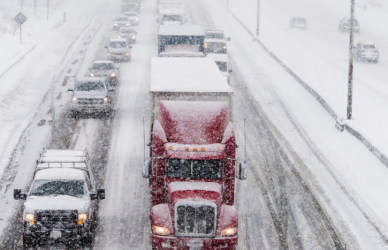Winter is here, and for truckers, that means facing the challenges of cold weather. One of the most common problems you’ll encounter during this season is diesel gelling. Diesel gelling occurs when the temperature drops, and your diesel fuel thickens to the point that it can clog your fuel system, leaving you stranded in the cold. With the right precautions and a little know-how, however, you can prevent diesel gelling and keep your truck running smoothly all winter long.
Here are six tips to help you combat this issue and ensure your rig stays on the road.
Use Winter Diesel Fuel
The first step in preventing diesel gelling is to switch to winter diesel fuel. This fuel is specially formulated for colder temperatures and has a lower gel point, meaning it will remain in liquid form at lower temperatures. Most gas stations switch to winter diesel fuel when the temperature drops, but it’s a good idea to double-check before filling up. Look for the “winterized” or “arctic” labels on the fuel pumps.
Add a Cold-Weather Diesel Additive
To further enhance the cold-weather performance of your diesel fuel, consider using a cold-weather diesel additive. These additives are designed to lower the gel point of your fuel, making it less likely to gel in sub-freezing temperatures. Be sure to follow the manufacturer’s instructions when adding the additive, as using too much can be as problematic as not using enough.
Park Indoors When Possible
If you have the option, park your truck indoors during extreme cold weather. Parking inside a heated garage or facility can help maintain a more consistent temperature and prevent your diesel fuel from gelling. If indoor parking isn’t available, try to park in a sheltered area or use windbreaks to shield your truck from the biting cold wind.
Keep Your Tank Full
Running your diesel fuel tank low in the winter can increase the risk of diesel gelling. When your tank is nearly empty, there’s more space for condensation to form inside. Water in your fuel can accelerate the gelling process. Keep your tank as full as possible to reduce the chances of water contamination.
Install Fuel Heaters
Consider installing fuel heaters if you frequently drive in extremely cold conditions. Fuel heaters warm the diesel fuel before it reaches the engine, preventing gelling. Some heaters are integrated into the engine’s design, while others can be added as aftermarket components. Make sure to consult a professional mechanic to ensure proper installation.
Regularly Maintain Your Truck
Proper maintenance is key to preventing diesel gelling and other cold-weather issues. Regularly change your fuel filters to keep contaminants out of your fuel system. Additionally, schedule routine maintenance to ensure your truck is running at its best during the winter months. A well-maintained truck is less likely to experience fuel-related problems.
As a trucker, you depend on your rig to get you where you need to go, regardless of the weather. Preventing diesel gelling is essential to keep your truck running smoothly during the winter. By following these tips, you can significantly reduce the risk of diesel gelling. Stay safe, stay warm, and keep those wheels turning, even in the coldest of winter weather.











